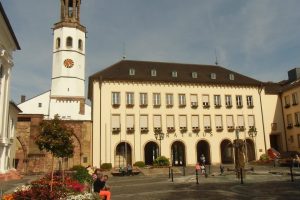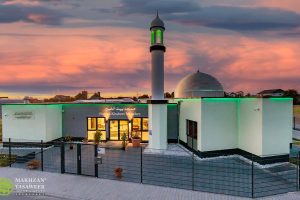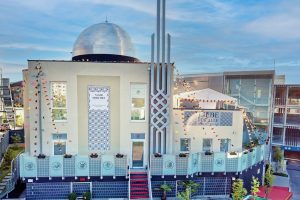English Translation of the Keynote Address by the Worldwide Head of the Ahmadiyya Muslim Community at the Inauguration of the Mubarak Mosque in Florstadt, Germany on 28th August 2023

Translated from Urdu by The Review of Religions Translation Team. The Review of Religions takes full responsibility for any errors in translation
*Please note that this transcript may not be reproduced without express permission, either on other websites or in print format.
After reciting Tashhahud, Ta`awwuz and Bismillah, Hazrat Mirza Masroor Ahmad (aba), Worldwide Head of the Ahmadiyya Muslim Community, Fifth Successor to the Promised Messiah (as), said:
‘To all respected guests, Assalamo Alaikum Wa Rahmatullahe Wa Barakatohu – (may the peace and blessings of Allah be upon you all).
We are grateful to Allah the Almighty that He enabled us to build a mosque in this area. According to our belief, a mosque is the house of God Almighty. A mosque is a place where people gather and worship the One God and, according to the teachings of Allah the Almighty, it is where they spread mutual love, affection and compassion. It is an obligation upon every true Muslim to safeguard all mosques and fulfil their due rights. It is impossible for a person who fulfils the rights of a mosque to act in a manner that prevents him from fulfilling the rights of Allah’s worship and the rights of other people.
Where the Holy Qur’an has instructed Muslims to be firm toward the disbelievers and respond to them sternly, it does not instruct Muslims to protect their own religion. Rather, Muslims are instructed to unite against such people who are opposed to religion, who desire to create chaos and disorder and who wish to eradicate the teachings of God’s prophets. For this reason, Allah the Almighty has stated in the Holy Qur’an that if such disbelievers who are killing Muslims are not countered firmly, they will not only eradicate Muslims, but in fact, no church, synagogue or any other temple will remain.
In essence, such people are opposed to religion. They are opposed to all religions that came from Allah the Almighty and were brought by His prophets. Thus, it is a fundamental teaching of Islam, that religion must be protected, and all other faiths must be respected. It is for this reason that we respect Moses (as), Jesus (as) and the prophets of the Hindus and Buddha (as). We respect every religion that appeared in this world, and in fact, we are commanded to respect all people. This command is emphasised to such a degree that the Holy Qur’an states that one should not insult even the idols of those who worship them and associate partners with Allah, lest they, in turn, revile God. If they mock God, it will create unrest in the world and lead to chaos, strife and conflict. This is the teaching of Islam upon which our mosques are established. This is God’s teaching, for Whom we construct our mosques and worship and for Whom we gather in one place. Thus, this is the fundamental teaching relating to our mosques.

Aside from this, some of our neighbours had reservations about us. This is because they observed the actions of such Muslims who committed wrongful actions in the name of Islam and who were spreading misguidance. The teachings of Islam, which are the teachings of the Holy Qur’an, or which have been taught by our Holy Prophet (sa), are replete with love, with peace and with compassion.
The Holy Qur’an has instructed us to fulfil the rights of our neighbours to such an extent that not only is your next-door neighbour considered a neighbour, rather, your neighbours are those who live within a distance of forty homes; your neighbours are those who travel with you; your neighbours are those who work with you in offices and factories. All of these people are your neighbours, and you should honour and respect them all.
In fact, the Holy Prophet (sa) emphasised the rights of neighbours to such an extent that the Companions remarked that perhaps neighbours would become entitled to their inheritance. This is the extent to which Islam affords neighbours their rights. For this reason, it is impossible for an Ahmadi Muslim – who is a true Muslim – to ever cause any sort of harm or discomfort to their neighbours. Hence, I wish to reiterate – as I have stated many times before – that our neighbours should be at ease in this regard.
If a mosque has been constructed here, it is for the worship of the One God; if a mosque has been constructed in this area, then it is as a symbol of peace, love, compassion and brotherhood. If a mosque has been constructed here, it is to demonstrate that expressions of love, compassion and brotherhood will resonate from here. And we will always be considerate toward and cooperative with our neighbours. I would like to thank the mayor, who did justice to our friendship. He was present, and we met when I went to inaugurate the mosque. I also met him the last time I visited, and he remembered all our discussions. He also expressed great love and kindness, and so in this respect, I am very grateful to him for regarding the Ahmadiyya Community with great honour and respect and for giving us his complete cooperation.
The mosque was built in the town centre, where there are many businesses and markets where worldly and material things are mostly bought and sold. However, religion should also be represented in such places so that the world may come to know of the true spiritual teachings, and so they learn about that which God bestows upon His people. When people see material things and benefit from them, they will also become grateful to their Creator and thus always remember Him. This is what we have been taught by Islam in the Qur’an: if we are grateful to God, then Allah the Almighty will increase His rewards and blessings upon us.

Thus, I believe that it is important for mosques to also be built in such places of material business, or for any place of worship belonging to any religion so that people do not become steeped in materialism alone, they should remember God as well, they should remember their Creator, and do justice in His worship. It is my hope that God-willing, upon the construction of this mosque, Ahmadis – who, as has been mentioned, are well connected and are good Ahmadis– will further exhibit their high morals, and this mosque will become known as a symbol of peace, love and affection in this area.
The mayor of Niddatal is also in attendance, and I would like to express my gratitude to him, as he has expressed very virtuous sentiments. I would also like to thank the Member of Parliament. The sentiments he has expressed are quite correct because today, the world truly needs peace and security. The world is spiralling towards catastrophe, and this is because we have forgotten our Creator. We have become engulfed in materialism and have started giving precedence to ourselves while we neglect to pay attention towards fulfilling the rights of others.
The logical outcome of this is what we now see coming to pass, which is injustices being perpetrated against one another.
In the Holy Qur’an, Allah the Almighty has taught us that if we do not fulfil the rights of others, then our worship will be rejected and thrown back at us. If we do not take care of the less fortunate, then our prayers and worship will not be accepted. If we fail to care for the orphans, then our worship and prayers will not be accepted. If we do not help the poor and underprivileged, then our worship and prayers will not be accepted. Hence, a mosque teaches us that if you have come to worship the One God, then you must come after having first fulfilled the rights of others: the rights of the orphans, rights of the less fortunate, and the underprivileged. God Almighty says it is after doing so that one should come to His mosque to worship, and it is then that He will accept their prayers.
Thus, along with the rights of Allah, a mosque also draws our attention towards the fulfilment of the rights of His creation. The Member of Parliament mentioned that there are injustices and wrongdoing in the world, where churches are being torn down, mosques are being damaged, where one sect is against the other, or one religion is against the other. Unfortunately, such injustices take place more so in Muslim countries or even here in Europe, as I gave the example of war.
The Holy Prophet (sa) has taught us that we should raise our voices against such injustices and help both the oppressed and the oppressor. The Companions asked the Holy Prophet (sa) that although they could help save the oppressed from the hands of the oppressors, how could they help the oppressors? The Holy Prophet (sa) responded by saying that helping the oppressors meant stopping them from committing their injustices because if they progress in their cruelties, they will become subject to the displeasure of Allah the Almighty and His punishment, thereby ruining their life in this world and the hereafter. Thus, the glances of a religious person are not only set on this world; rather, they look to the hereafter as well. They are not concerned only for themselves; rather, they are also concerned with saving others from punishment and from the displeasure of Allah in the hereafter.
Thus, these are the objectives for why we strive to do justice in worship, and it is for this purpose that when we focus on fulfilling the rights of worship, we also develop the spirit of fulfilling the rights of other people and the spirit of helping both the oppressed and the oppressors. Alongside the rights of Allah, it draws our attention towards the rights of His creation.
Now, after the completion of this mosque, may Allah the Almighty enable the members of the Ahmadiyya Community living here to make themselves more recognisable than before; a recognition which is based on love, affection, peace and brotherhood. May they spread that teaching which is of love, affection and brotherhood and thereby, may we become those who establish peace in the world, eradicate injustice and always be those who raise their voice against injustices. May enable all of us to do so.’




Add Comment